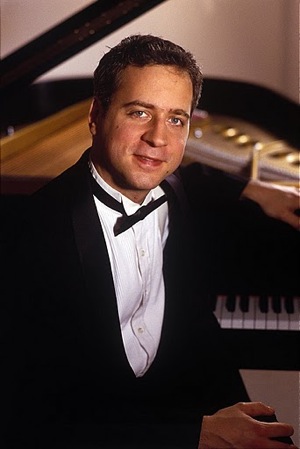From Ligeti’s fiendish fingerings…
An eagerly awaited program by pianist Jeremy Denk held revelations and disappointments Sunday October 24 at Hertz Hall on the UC campus. In a last-minute program change Denk substituted Franz Liszt’s Dante Sonata for György Ligeti’s second book of piano études.
 The Liszt was indeed revelatory, and flowed from the chromaticism that ended Ligeti’s first book of études.
The Liszt was indeed revelatory, and flowed from the chromaticism that ended Ligeti’s first book of études.
The corollary to those piano studies, Bach’s gem-like Goldberg Variations, filled the second half of the program, and was, for the most part, a disappointment. Much of the middle variations were a little rushed, or a little blurred, or a little mechanical.
But Denk’s glorious rendition of the final variation, and his courageous programming, made a nice apology.
Ligeti really is fiendishly difficult. And when he is not, his intent can be impenetrable. Part exercise and part whimsy, Désordre, his first piano étude, restricts the right hand to the white keys and the left hand to the black keys. While this allows the hands to pass through each other easily, it also creates conflicting idioms for each hand. And that conflict propels the “disorder” of the title. From the white keys Ligeti creates diatonic scales and the modes of the West, while the black keys impart an Eastern pentatonic scale.
Though theory seems to box the notes conveniently, the two hands’ interaction is another matter entirely! And over this Ligeti adds shifting accents to propel movement up and down the keyboard. But while the pianist grapples with complexity, a listener discerns pattern, chords repeated and brought to life with off-kilter beats. Those patterns shift down the keys, building to powerful rumbles, then return to high phrases and notes that sound like falling down the stairs—or rather, up the stairs!
The ease with which Denk navigates disorder was presaged before he took the stage. New Cal Performances director Matías Tarnopolsky whispered to the very well known pianist sitting behind me that they needed an emergency page-turner for the Ligeti. “But I don’t have my glasses…and I’m wearing a very short skirt,” she replied, and suggested another pianist that I recognized—sitting in front of me! Though startled, he was happy to oblige. And I realized one could hardly toss a ball without beaning a pianist in the near-capacity hall, such was the draw of those fiendish études.
The second was slow and reverent. The fourth, full of a bubbling and improbable energy. And the fifth, Arc-en-ciel, was sweetly meditative and molded from softly complex intervals. Denk repeated this as an encore. Though some grumbled, I was happy to hear it, burnished by that last golden Bach aria.
… to Liszt’s hell and Bach’s heaven
Drawing parallels from Ligeti’s sixth étude, “autumn in Warsaw,” Denk spoke of Ligeti’s descending chromaticism—and Liszt’s chromatic descent down into Dante’s Hell.
“The Liszt piece is all about Dante’s Divine Comedy. Having slept his way across Europe during the 1830’s, and then perhaps regretting it, he wrote this. But the thing about Liszt is that you’re not sure if you want to end up in Heaven or Hell. His damnation is very alluring.”
Powerful descending tritones and lethargic rise is Liszt’s call to the damned, followed by a passage of brooding chromaticism. Denk followed this with sweeping Romantic statements and then a shift to redemptive Major. But even those forgiving chords had a dark center, an ambivalence that softened to regret. Denk, in a masterly performance, gave voice to torments of those not yet born.
For the second half of the program one needed delicacy and joy. The long and difficult variations, played at a very fast pace, may have been Denk’s self-imposed penance for dwelling too long in Liszt’s lower realms.
And that hour of struggle apparently succeeded, for when he played the final aria, a slow restatement of the theme, it simply glowed.
—Adam Broner
Photo of Jeremy Denk courtesy of Classical Artists. This article was originally published by the Piedmont Post.
